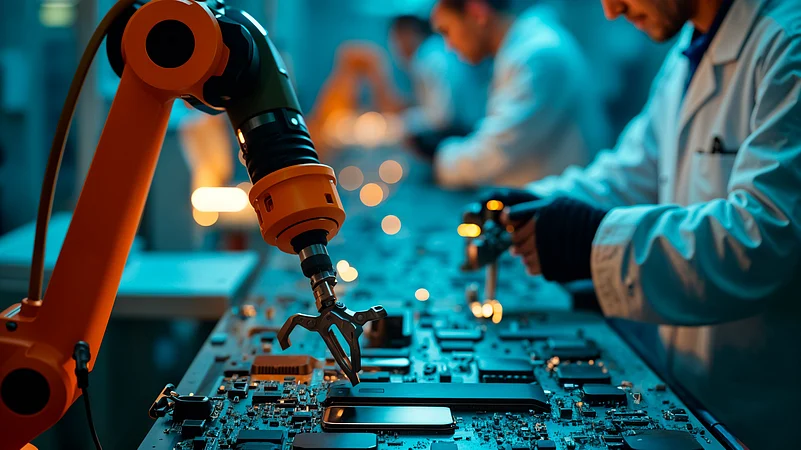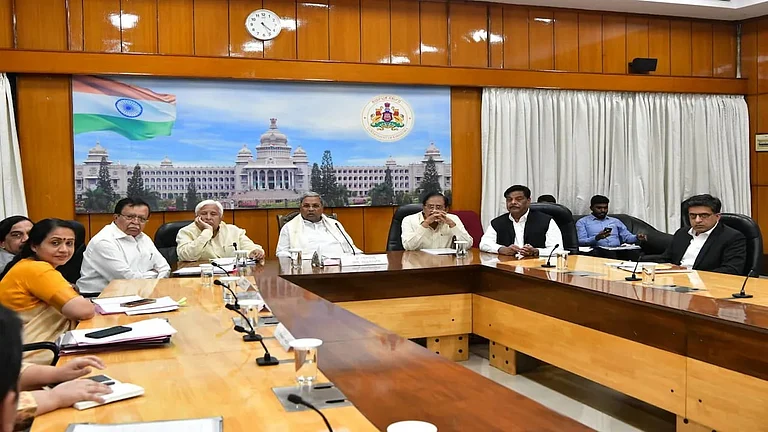
Cabinet approves four new semiconductor projects with a total investment of ₹4,600 crore.
This raises approved projects under the India Semiconductor Mission to 10, with a total investment of ₹1.60 lakh crore across six states.
New projects will be set up in Odisha, Andhra Pradesh, and Punjab.
Proposals are from SiCSem, Continental Device, 3D Glass Solutions Inc., and ASIP Technologies.
The Union Cabinet, chaired by Prime Minister Narendra Modi, on Tuesday approved four additional semiconductor projects under its flagship India Semiconductor Mission (ISM), with a cumulative investment of around ₹4,600 crore. This takes the total number of approved projects under the mission to 10, with combined investments of around ₹1.60 lakh crore spread across six states.
"Four new semiconductor projects have been approved. You know that six projects are already approved, and four new ones have been added today. These are in Odisha, Andhra Pradesh, and Punjab, at an investment of ₹4,594 crore," said Union Minister for Electronics and IT Ashwini Vaishnaw.
He added that the projects will focus on compound semiconductors and advanced packaging units, which are key to boosting India’s electronics manufacturing ecosystem. He also stressed that “without semiconductors, no country can call itself developed”, calling them a “foundational industry.”
The four proposals are from SiCSem, Continental Device India Private Limited (CDIL), 3D Glass Solutions Inc., and Advanced System in Package (ASIP) Technologies. SiCSem and 3D Glass will be set up in Odisha, CDIL will expand in Punjab, and ASIP will be established in Andhra Pradesh.
Together, these projects are expected to generate 2,034 skilled jobs, according to a government release.
Chennai-based SicSem Pvt Ltd is collaborating with Clas-SiC Wafer Fab Ltd of the UK to set up India’s first commercial Silicon Carbide compound semiconductor fab in Bhubaneswar, Odisha. The facility will have an annual capacity of 60,000 wafers and 96 million packaged units, producing devices for defence, EVs, railways, chargers, data centres, appliances, and solar inverters.
America’s 3D Glass Solutions Inc. (3DGS) will establish an advanced packaging and embedded glass substrate unit in Bhubaneswar, featuring what it claims is world-leading packaging technology. The plant will have a capacity of 69,600 glass panel substrates, 50 million assembled units, and 13,200 3DHI modules per year, catering to defence, AI, high-performance computing, RF, automotive, and photonics applications.
Hyderabad’s Advanced System in Package Technologies (ASIP) will set up a semiconductor manufacturing unit in partnership with APACT Co. Ltd of South Korea. The plant will have an annual capacity of 96 million units, producing components for mobiles, set-top boxes, automotive, and other electronics.
Delhi-based Continental Device India Ltd (CDIL) will expand its Mohali facility to produce high-power discrete devices such as MOSFETs, IGBTs, Schottky diodes, and transistors in both silicon and Silicon Carbide. The brownfield expansion will add 158.38 million units annually, catering to EVs, renewable energy, industrial systems, and communication infrastructure.
"With the approval of these projects, the semiconductor ecosystem in the country will get a significant boost, as these include the country’s first commercial compound fab as well as a highly advanced glass-based substrate semiconductor packaging unit," the government said. It added that these would complement India’s growing world-class chip design capabilities, propelled by design infrastructure support provided to 278 academic institutions and 72 start-ups under ISM.
The Centre has already approved plants of Micron Semiconductor, Tata Semiconductor, CG Power, Kaynes Semicon, and the HCL-Foxconn JV under ISM. As per reports, Micron’s Sanand facility reached a critical cleanroom validation stage in its first phase in June — an essential milestone that brings it closer to operational readiness. It is expected to become operational in the second half of 2025.


































